Train Commuters Receive Red Carpet Surprise
Friday 12th November
MEDIA RELEASE
Wellington Train Commuters Receive Red Carpet Surprise
HON PETE HODGSON, MAYOR KERRY PRENDERGAST AND OTHER DIGNITARIES GREET COMMUTERS WITH RED CARPET STANDING OVATION
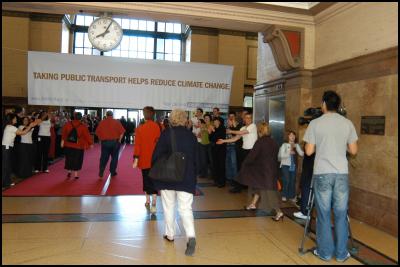
Wellington train commuters were surprised to be given a standing ovation as they exited the main train station this morning. Hon Pete Hodgson, Wellington City Mayor Kerry Prendergast and other dignitaries were amongst those cheering and clapping the commuters as they walked on the red carpet
The Ministry for the Environment’s New Zealand Climate Change Office (NZCCO) organised the event to congratulate commuters for using public transport (instead of their cars) and helping to lower greenhouse gas emissions, which contribute to climate change. The event was part of the NZCCO’s 4 million careful owners campaign.
A red carpet was laid in the main foyer and people posing as paparazzi took photographs of the commuters as they walked the 16 metre stretch of red carpet, flanked both sides by members of parliament, mayors, councillors and other dignitaries. Comedian Michele A’ Court emceed the event.
General Manager of the Ministry for the Environment’s Sustainable Industry & Climate Change group Bill Bayfield says the commuters were initially overwhelmed by the reception they received.
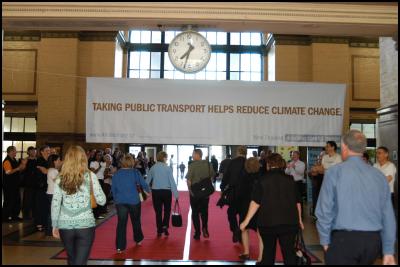
“The look on the commuters’ faces was initially one of surprise, then one of pride when they realised the red carpet and cheering crowd was for them. By taking public transport people are helping to reduce greenhouse gas emissions which contribute to climate change. We wanted these commuters to know they are making a difference – and to feel appreciated,” says Mr Bayfield.
“On a global scale it may be considered a small contribution towards reducing climate change – but it’s certainly an important one. Every small step counts.
“Because New Zealand is a country very reliant on a stable climate, every small increase in temperature has a direct impact on our economy and our environment. We need to take action now to minimise the risks. Only the reduction of greenhouse gas emissions will ensure we continue to have a climate in which New Zealand’s agricultural industry can prosper. These train commuters are helping – so it’s only fair that we show our appreciation,” says Mr Bayfield.
The NZCCO is implementing a number of national programmes and initiatives to encourage individuals, communities, businesses and sectors to reduce the amount of greenhouse gases they produce.
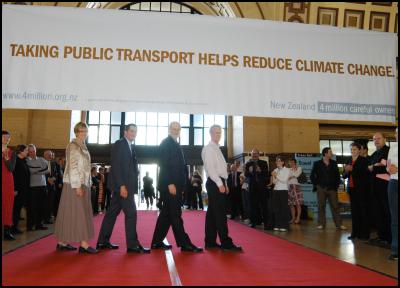
Click for big version
“We acknowledge there are individuals and businesses that really do care about their impact on the environment and are already taking action to reduce their greenhouse gas emissions. However, it would be great if everyone could follow their leading example.
“If we don’t take action today, we are facing some very serious problems in the future. We can’t sit around and expect others to take action – it’s too important an issue to not do our bit. It’s about being a responsible member of the global community,” says Mr Bayfield.
The main greenhouse gases that contribute to climate change include carbon dioxide, methane, nitrous oxide and a number of synthetic greenhouse gases. Taking public transport reduces the amount of cars on the road and therefore, the amount of greenhouse gases released into the atmosphere (because fossil fuels such as oil produce carbon dioxide when burned).
Judy Lawrence, Director of the NZCCO at the Ministry for the Environment, says taking actions to reduce climate change can save individuals, businesses and sectors money – as well as help the environment.
“Reducing greenhouse gas emissions can actually save homes and businesses money as it is all about energy efficiency and reducing fuel consumption. There are a wide range of easy actions and choices people can make in their daily lives which not only save them money but also contribute to making a real difference to the future of the planet’s climate by reducing greenhouse gas emissions,” says Ms Lawrence.
“It’s not a matter of if climate change will happen, it’s a matter of how soon we will experience the negative effects. If we wait until all negative effects have become apparent, it will be too late to do anything about them.
“We are working with industry groups across a range of sectors to acknowledge what they are doing and to find new innovative ways of transitioning to a lower carbon future.
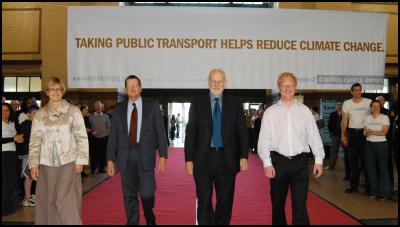
Click for big version
“Our 4 million careful owners website [www.4million.org.nz] includes a fun quiz that tests people’s knowledge on greenhouse gases through a series of lifestyle related questions. It also provides them with a range of actions they can take to save money and reduce the amount of greenhouse gases they produce. I am sure many people will be surprised by some of the answers in the quiz,” says Ms Lawrence.
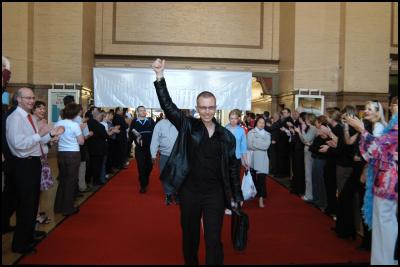
Click for big version
Climate Change Information
Greenhouse gases trap heat from the sun and act like an invisible blanket around the Earth which makes our planet’s surface warmer. If there weren’t any greenhouse gases, the Earth would be too cold to live on. But if we keep putting more greenhouse gases into the air, the blanket around the Earth will keep on getting thicker and it will get even warmer. The warmer the Earth gets, the more the climate is likely to change.
People burn fossil fuels such as oil, coal and gas to power factories and make electricity for homes and businesses. Fossil fuels release carbon dioxide into the atmosphere. Therefore the more oil, coal, gas and electricity we use, the more carbon dioxide is produced.
Large amounts of organic waste (such as grass clippings, kitchen scraps and rotting wood) in landfills produce methane as they decompose – because the piles of waste are so huge, not much oxygen can get in to help the break down process, therefore methane is produced.
Increasing greenhouse gas emissions from human activities such as transportation, industry, agriculture, energy production and deforestation are likely to have caused most of Earth’s warming in the last 50 years.
If we do not take action to reduce human caused greenhouse gas emissions, the world is likely to experience a rise in temperature, increasing sea levels, more frequent extreme weather events and a change in rainfall patterns. These climatic changes are likely to impact on our native ecosystems, industries, infrastructure, health, biosecurity and economy.
The biggest amount of carbon dioxide in New Zealand comes from the use of transport and from making electricity (about one third of our electricity is generated from fossil fuels such as coal and gas which emit carbon dioxide when burned).
At the moment, New Zealand’s gross greenhouse gas emissions are about 21.9% above what they were in 1990. Our Kyoto Protocol target is to reduce our net greenhouse gas emissions to the level they were in 1990.
The New Zealand Climate Change Office
The New Zealand Climate Change Office (NZCCO) at the Ministry for the Environment is responsible for advice on and implementation of climate change policy. This is a whole-of-government approach and several other departments have responsibility for different parts of the policy. The climate change policy is designed to enable and encouarge New Zealanders to make significant greenhouse gas reductions. The NZCCO is also responsible for managing risks and opportunities arising from the effects of climate change. It is led by Director, Judy Lawrence.
Website Information: www.4million.org.nz
and
www.climatechange.govt.nz


 Gordon Campbell: On Budget 2025
Gordon Campbell: On Budget 2025 Colin Peacock, RNZ: Mediawatch - How A Budget Is Covered
Colin Peacock, RNZ: Mediawatch - How A Budget Is Covered SKYCITY Auckland: Firefighter Sky Tower Challenge Raises Over $1.9 Million
SKYCITY Auckland: Firefighter Sky Tower Challenge Raises Over $1.9 Million Greenpeace: Regulatory Standards Bill Inflicts ACT's Far-Right Principles On Aotearoa
Greenpeace: Regulatory Standards Bill Inflicts ACT's Far-Right Principles On Aotearoa Rainbow Wellington: Rainbow Wellington Concerned By Reports Of Increased Abuse
Rainbow Wellington: Rainbow Wellington Concerned By Reports Of Increased Abuse ACT New Zealand: David Seymour's Budget Day Speech 2025
ACT New Zealand: David Seymour's Budget Day Speech 2025 Government: Minister Of Finance’s Budget 2025 Speech
Government: Minister Of Finance’s Budget 2025 Speech


